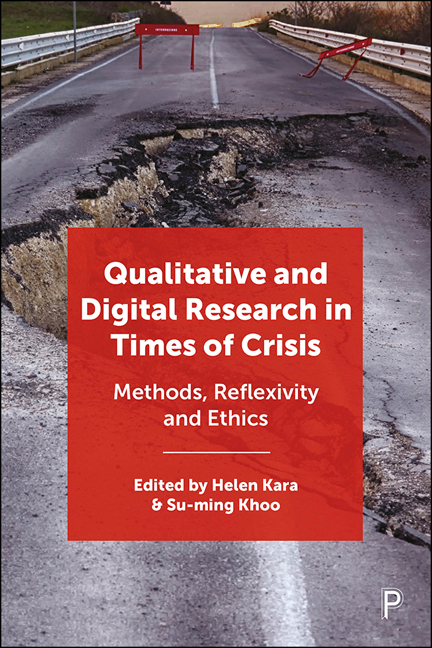4 - The arts of making-sense in uncertain times: arts-based research and autoethnography
Published online by Cambridge University Press: 13 May 2022
Summary
The creative arts therapies offer experiences of psychotherapy that are polysensory, paradoxical, performative, and provocative. This variegated practice is, however, often researched using rigid and reductive processes – causing we arts therapists-researcher-educators at Whitecliffe College (Aotearoa New Zealand) to itch for less dissonance between what we research and how we research it, and greater congruence between skill-sets practised in both research and therapy. We thus embarked upon diverse adventures with self-as-subject and creative research, which we now entangle under the investigational umbrella-term abr+a (arts-based research through autoethnography) (Green et al, 2018). Fuelled by belief that arts therapists enhance both self and profession using these performative research approaches, abr+a now influences research taught and practised by faculty and students in the Whitecliffe School of Creative Arts Therapies.
McNiff's (1998: 170) exhortation to arts therapists that ‘the process of research should correspond as closely as possible to the experience of therapy’ informs this choice to blend arts-based research (ABR) and autoethnography (Holman Jones, Adams, and Ellis, 2015; Leavy, 2018). Simultaneously a practice, process, and product, ABR is an ‘aesthetic way of knowing’ (Greenwood, 2012): the researcher investigates a research question through artistic creating during data gathering/generation and/or analysis/translation and/or presentation. Autoethnography studies ‘the culture of self ‘ (Ricci, 2003) or others through self, encouraging ‘researchers to start with their own lived experiences as a way of uncovering new ways of knowing and understanding wider cultural beliefs’ (Gray, 2011: 67).
When COVID-19 began affecting our personal, professional, and educational worlds, we turned to abr+a to help us express, explore, and endure these uncertainties. In this chapter, we demonstrate how in April 2020, during our first major lockdown in Aotearoa, we used abr+a to craft and share metaphors for the pandemic. During this initial iteration, we lecturers gifted our nascent metaphors for the pandemic to our Master of Arts in Arts Therapy (MAAT) students. This cohort in turn used abr+a to birth, explore, and share their own generative metaphors.
- Type
- Chapter
- Information
- Qualitative and Digital Research in Times of CrisisMethods, Reflexivity and Ethics, pp. 59 - 77Publisher: Bristol University PressPrint publication year: 2021



